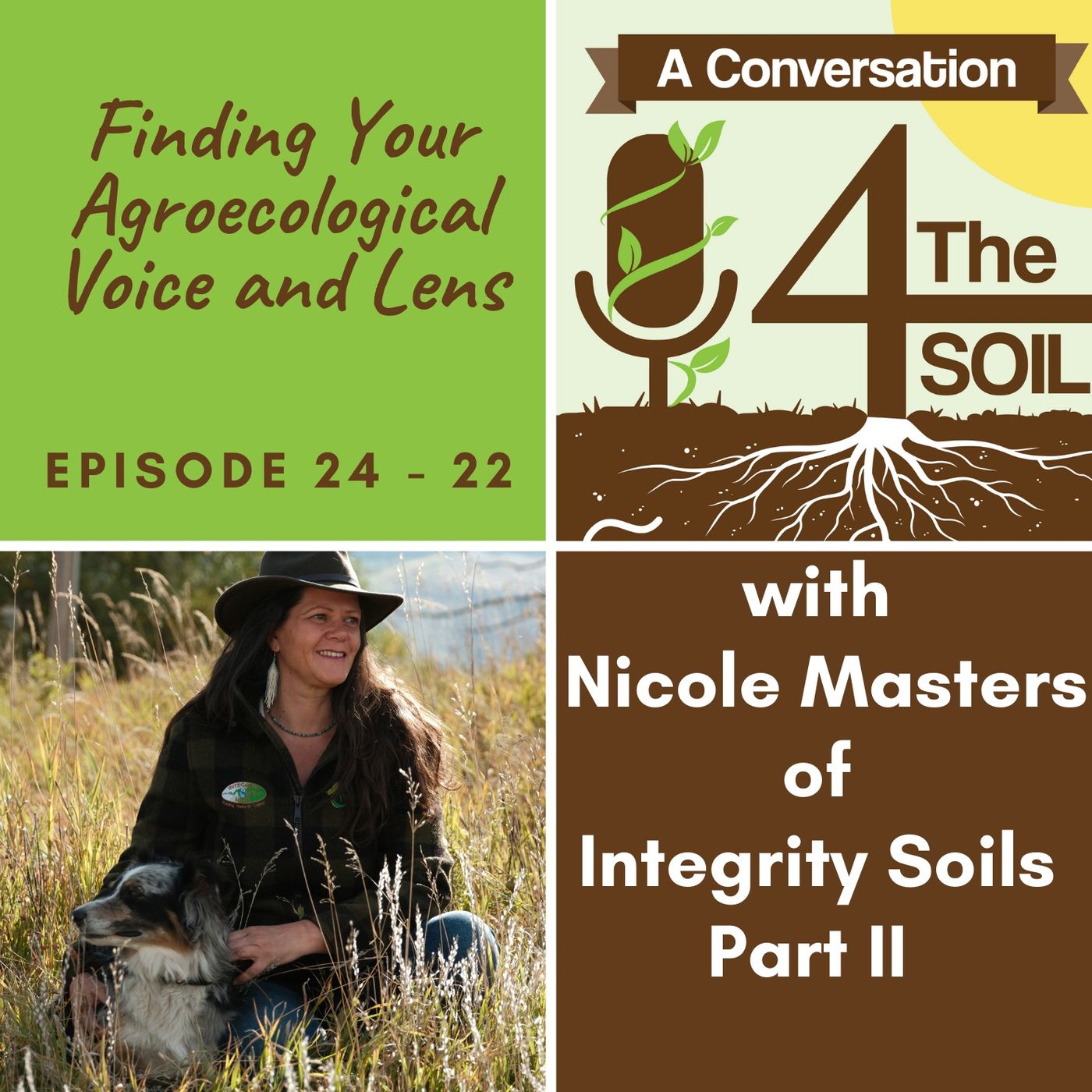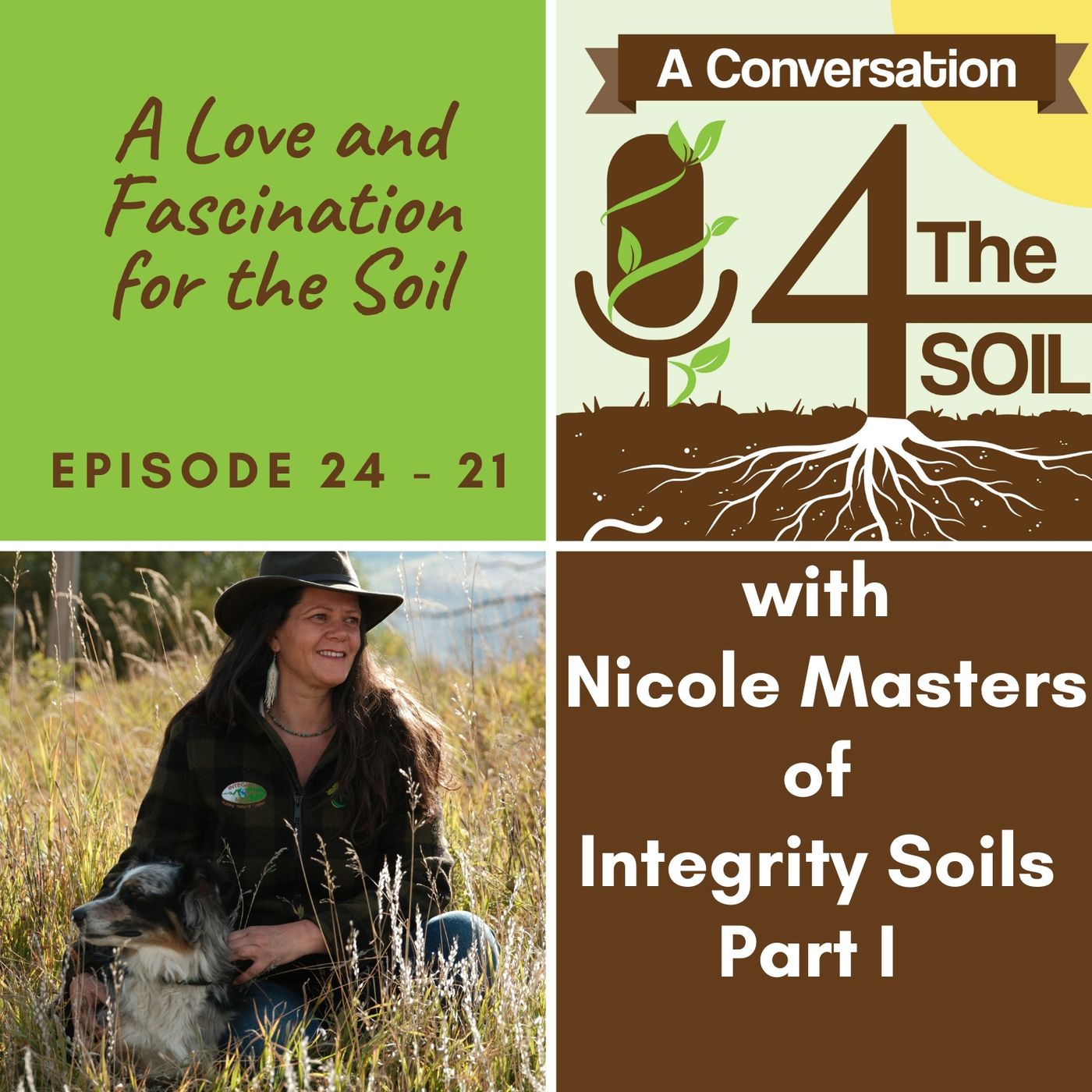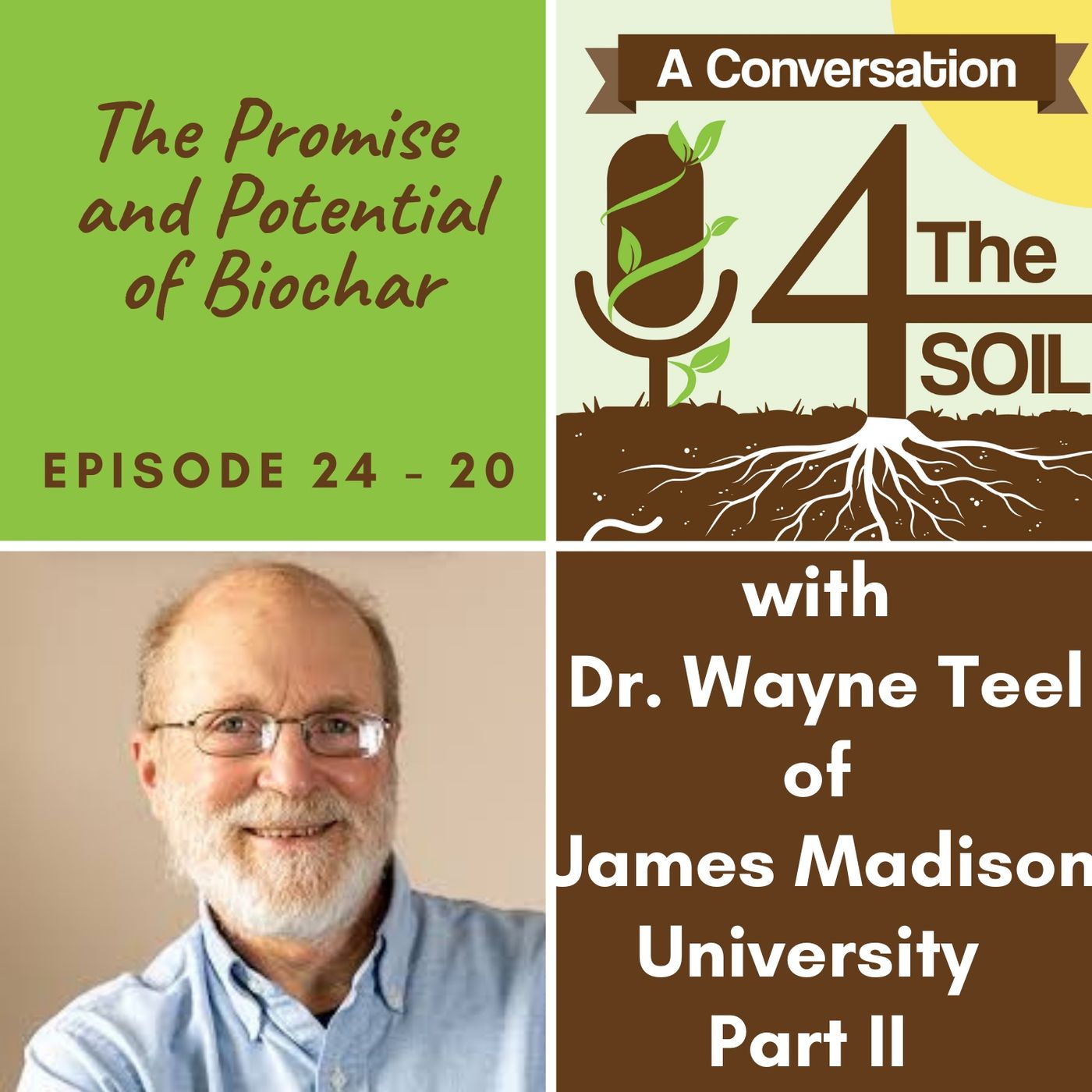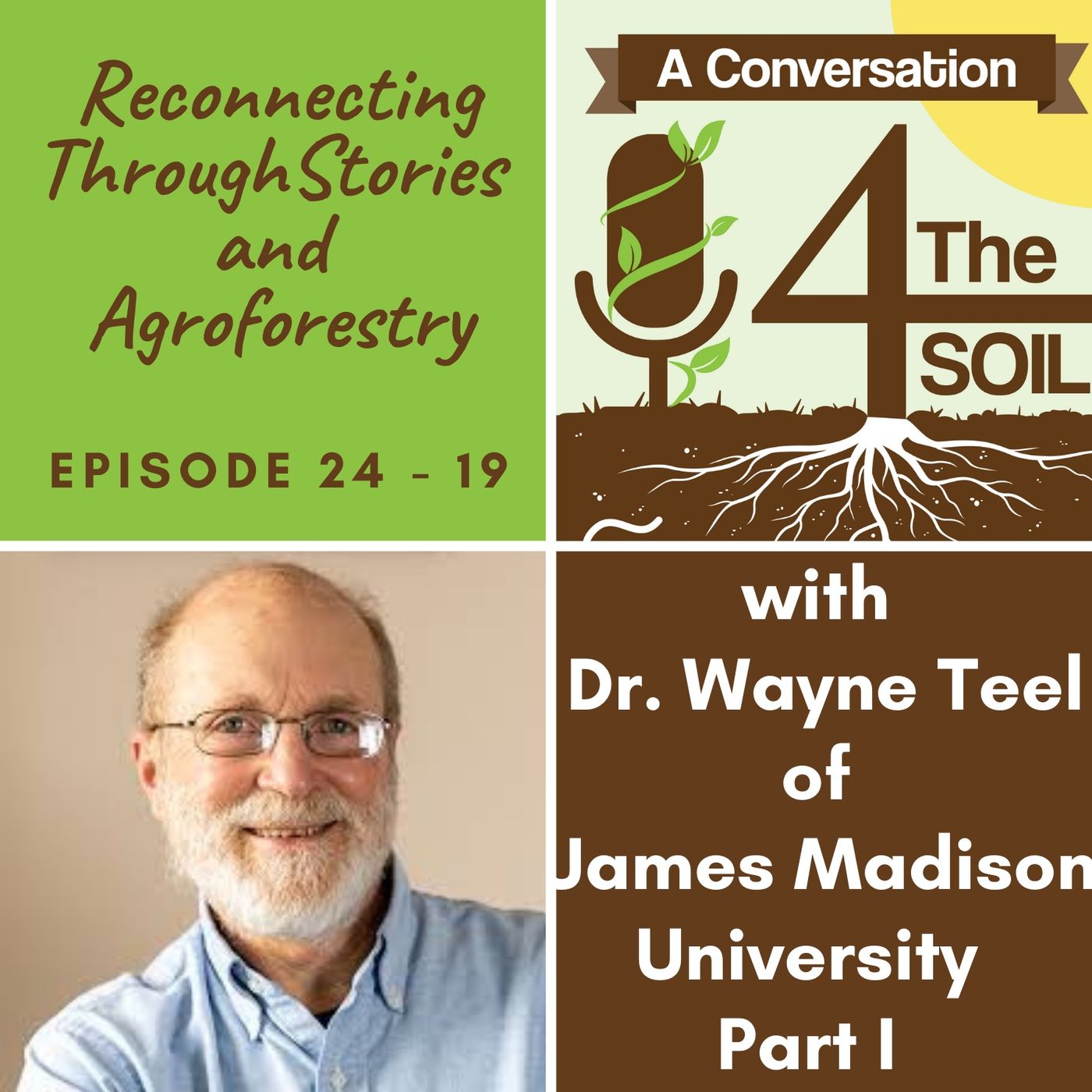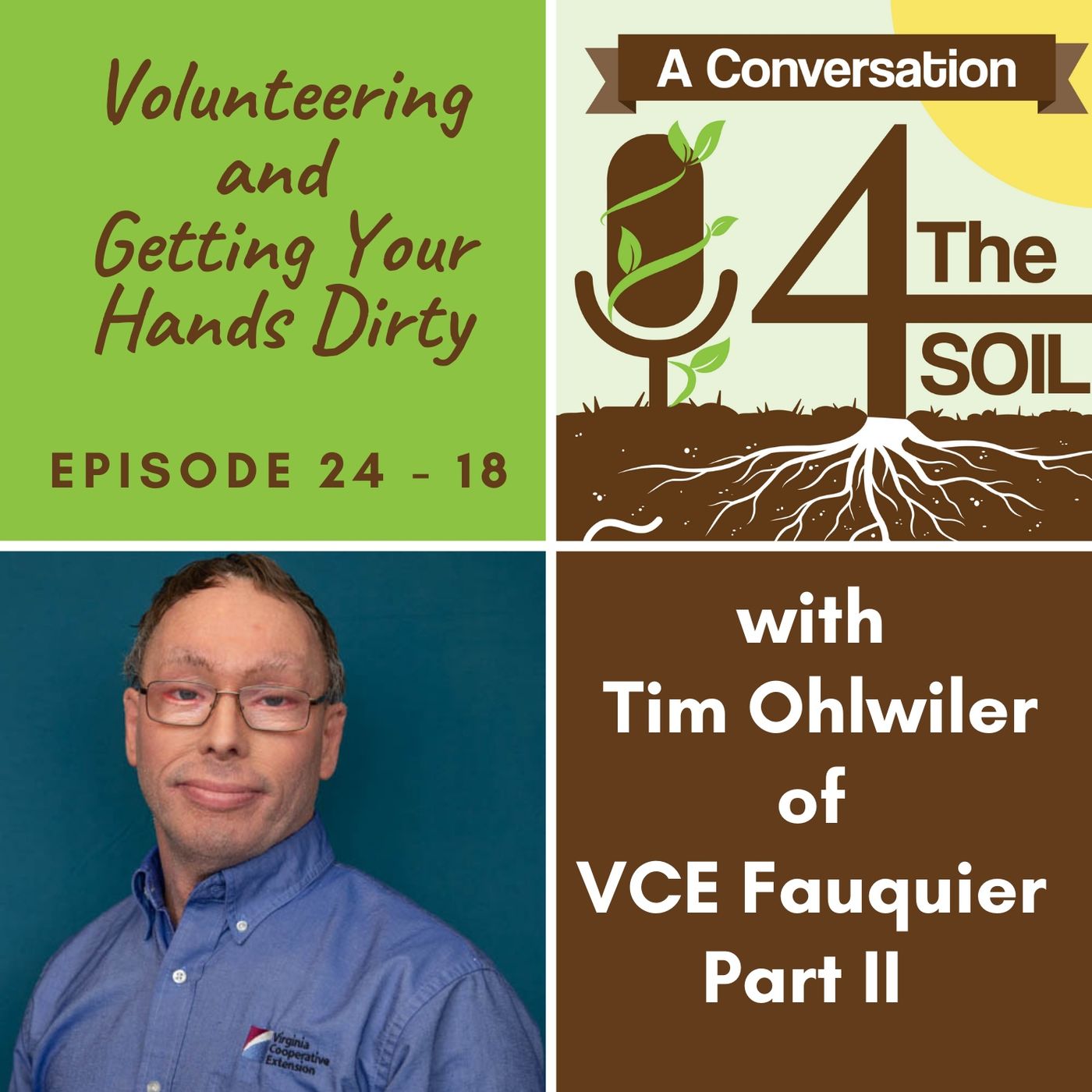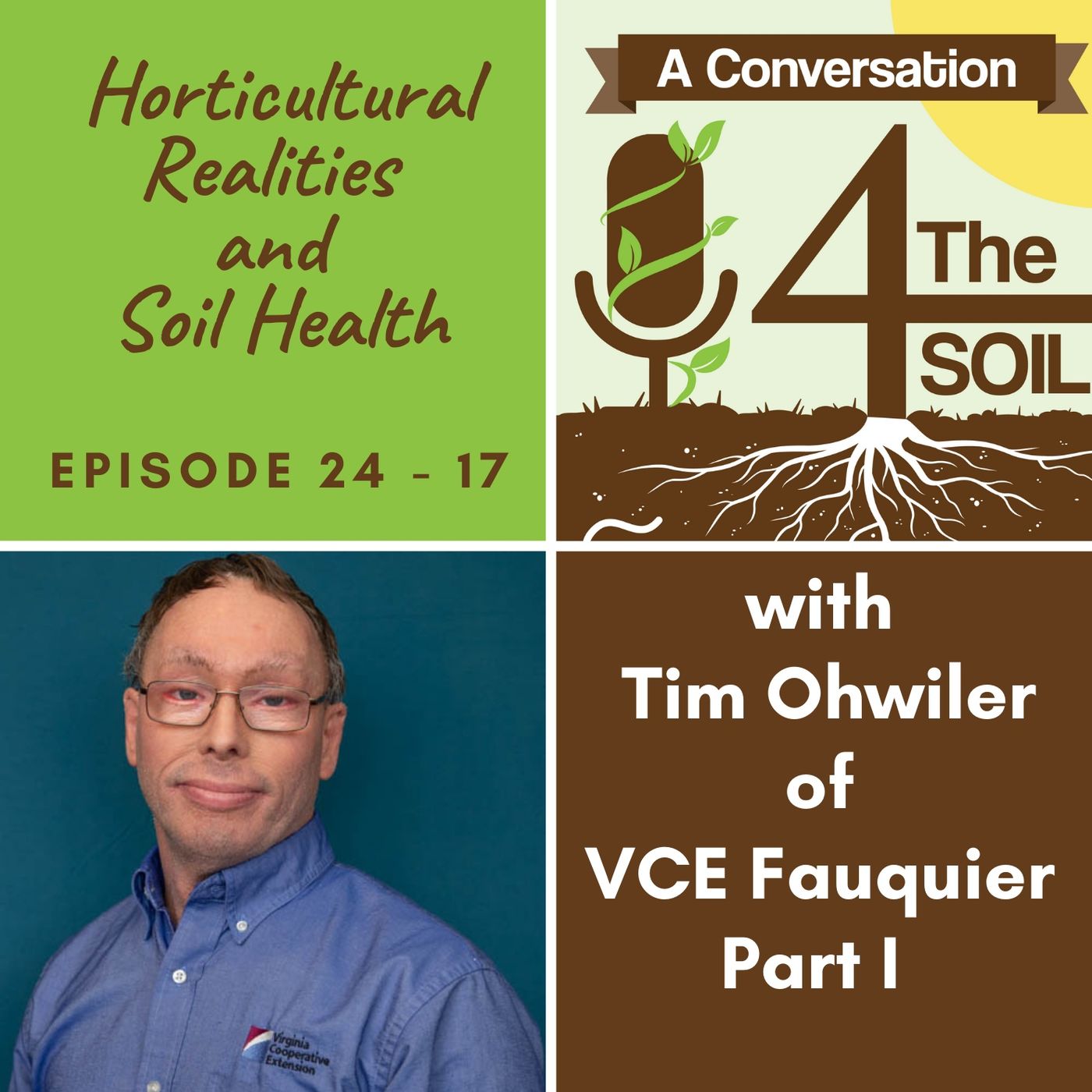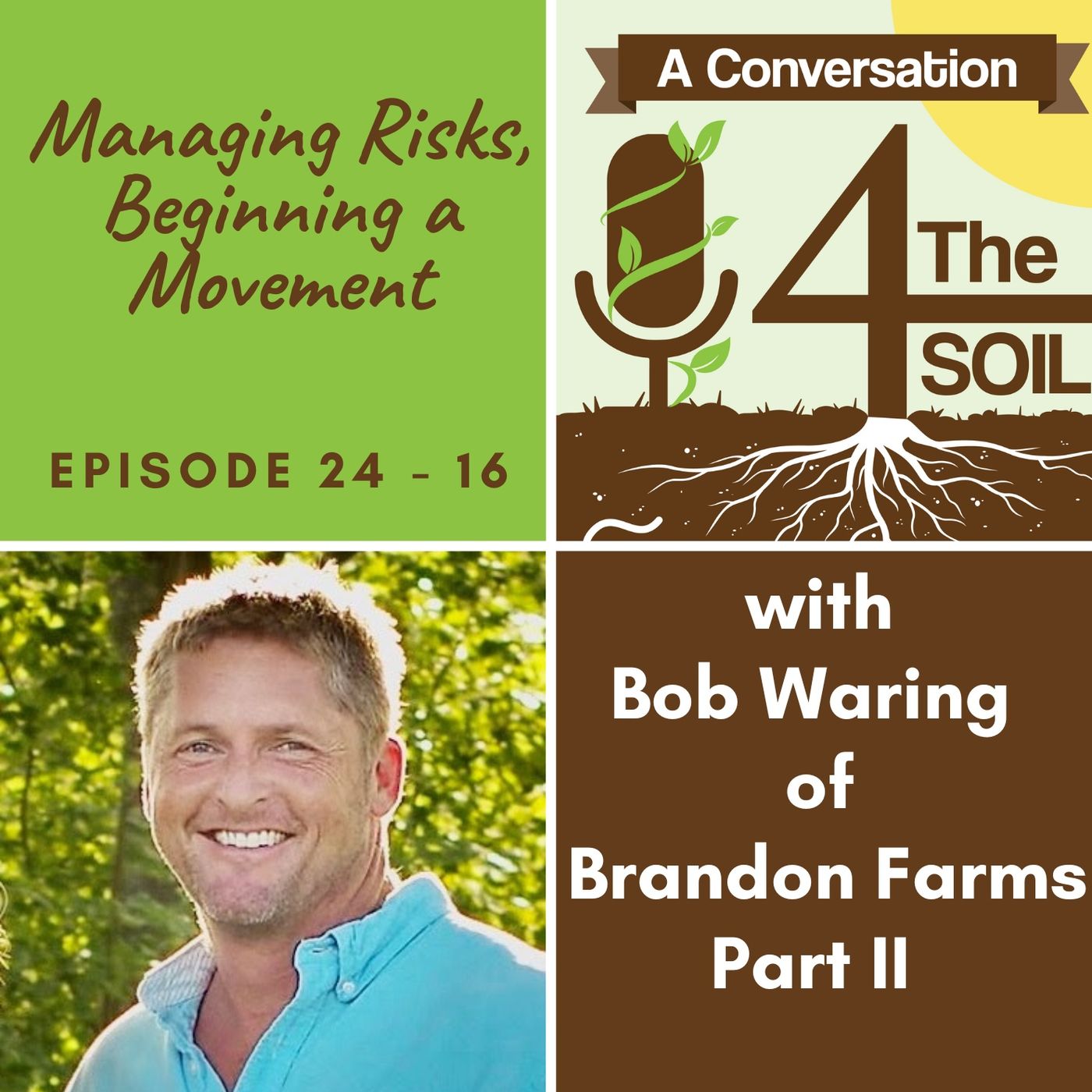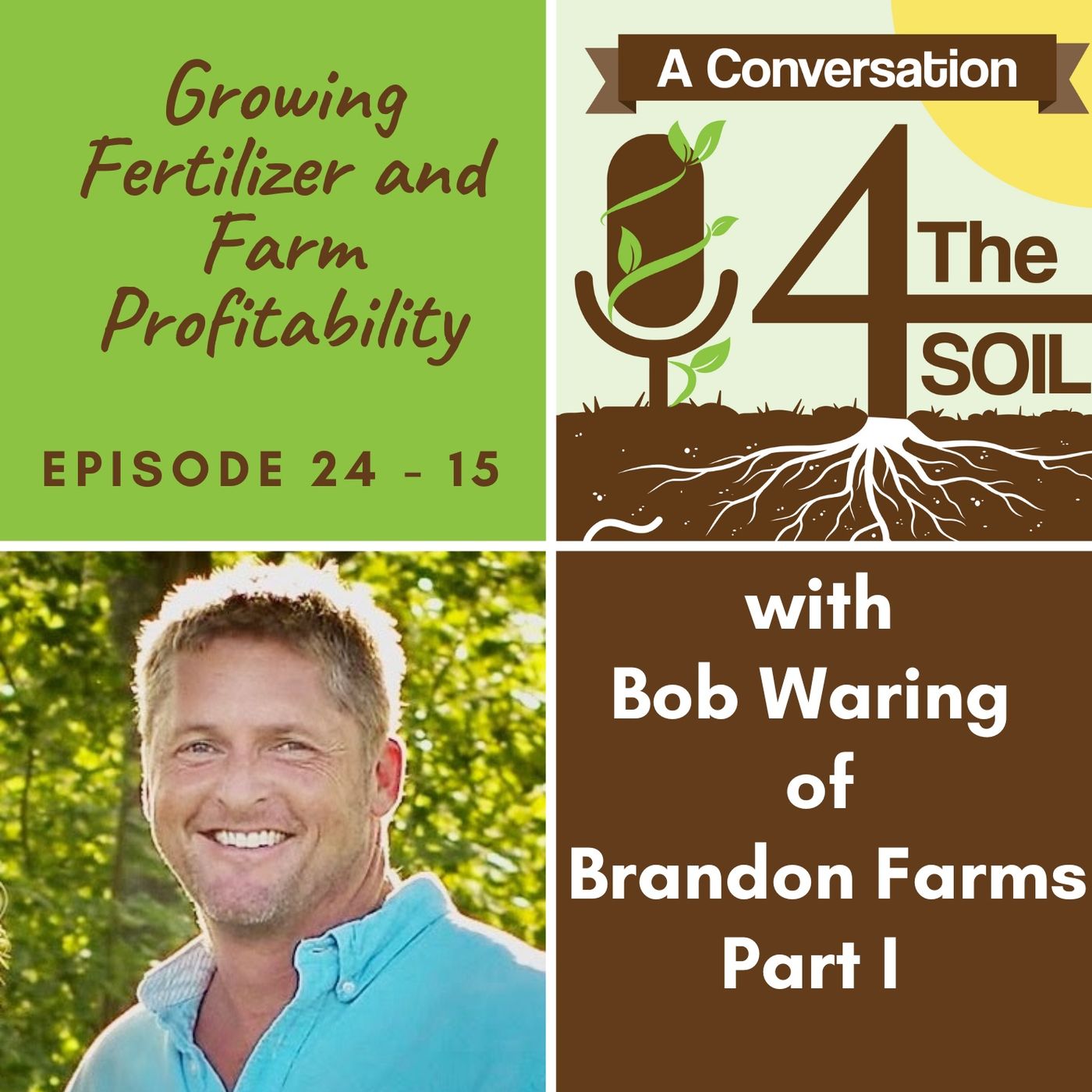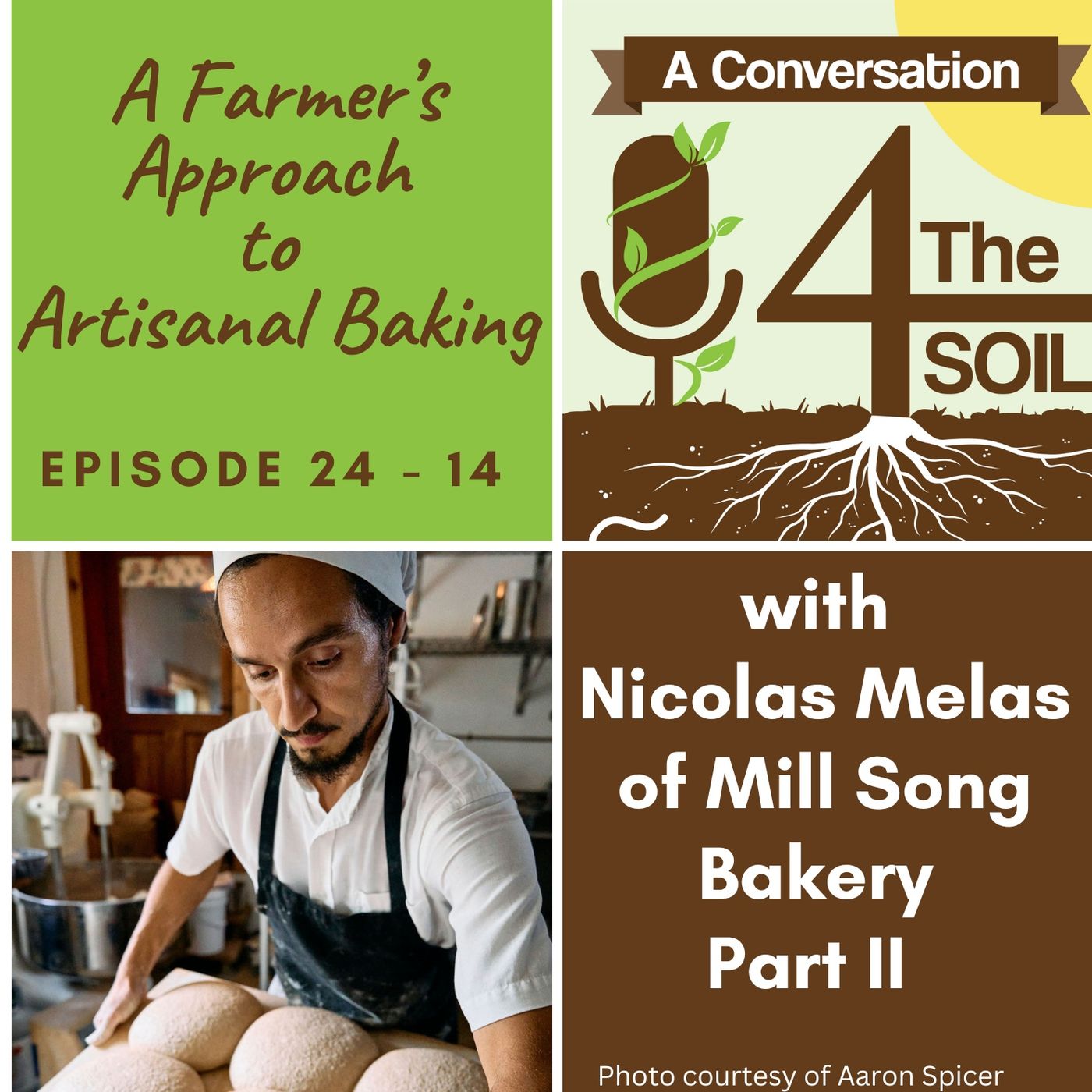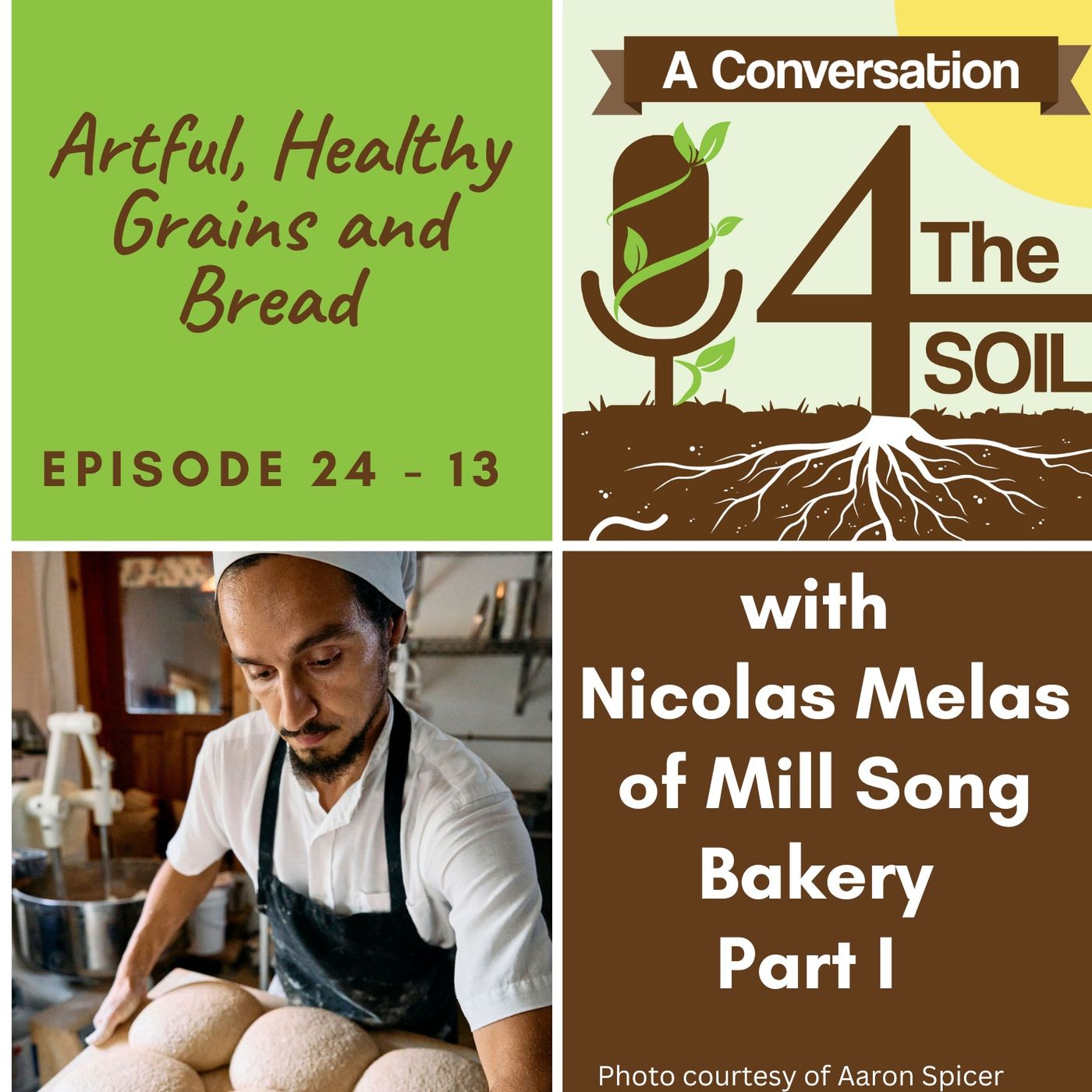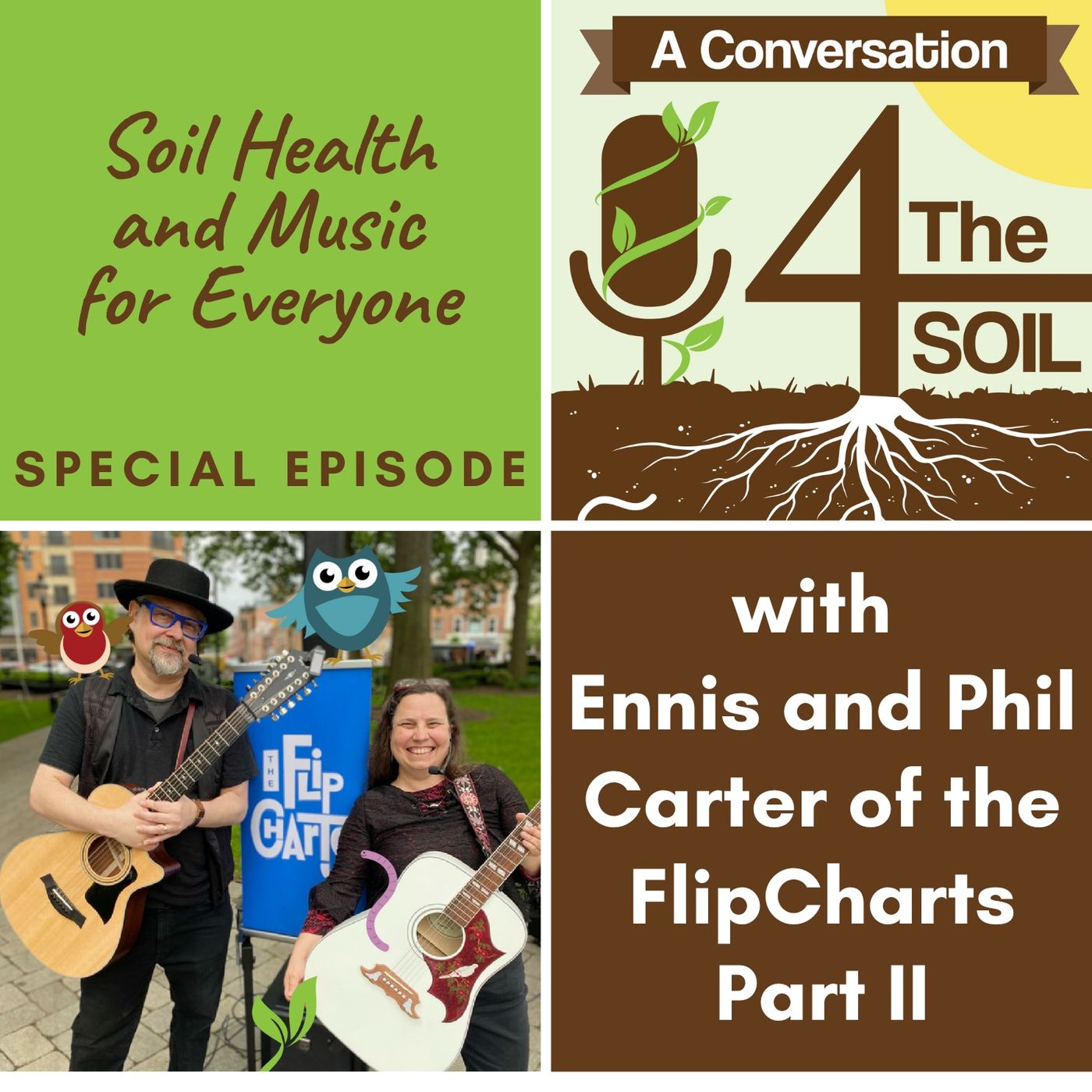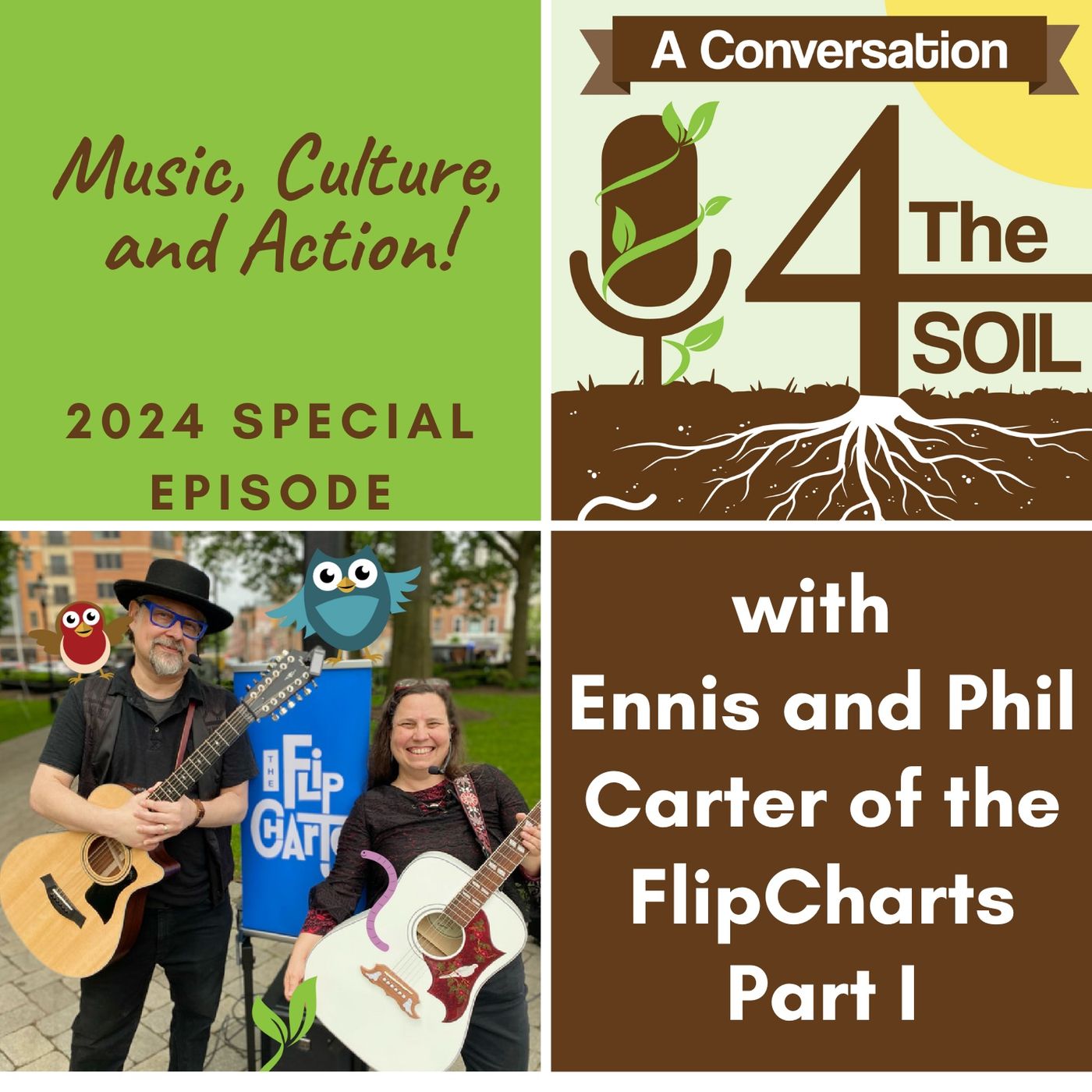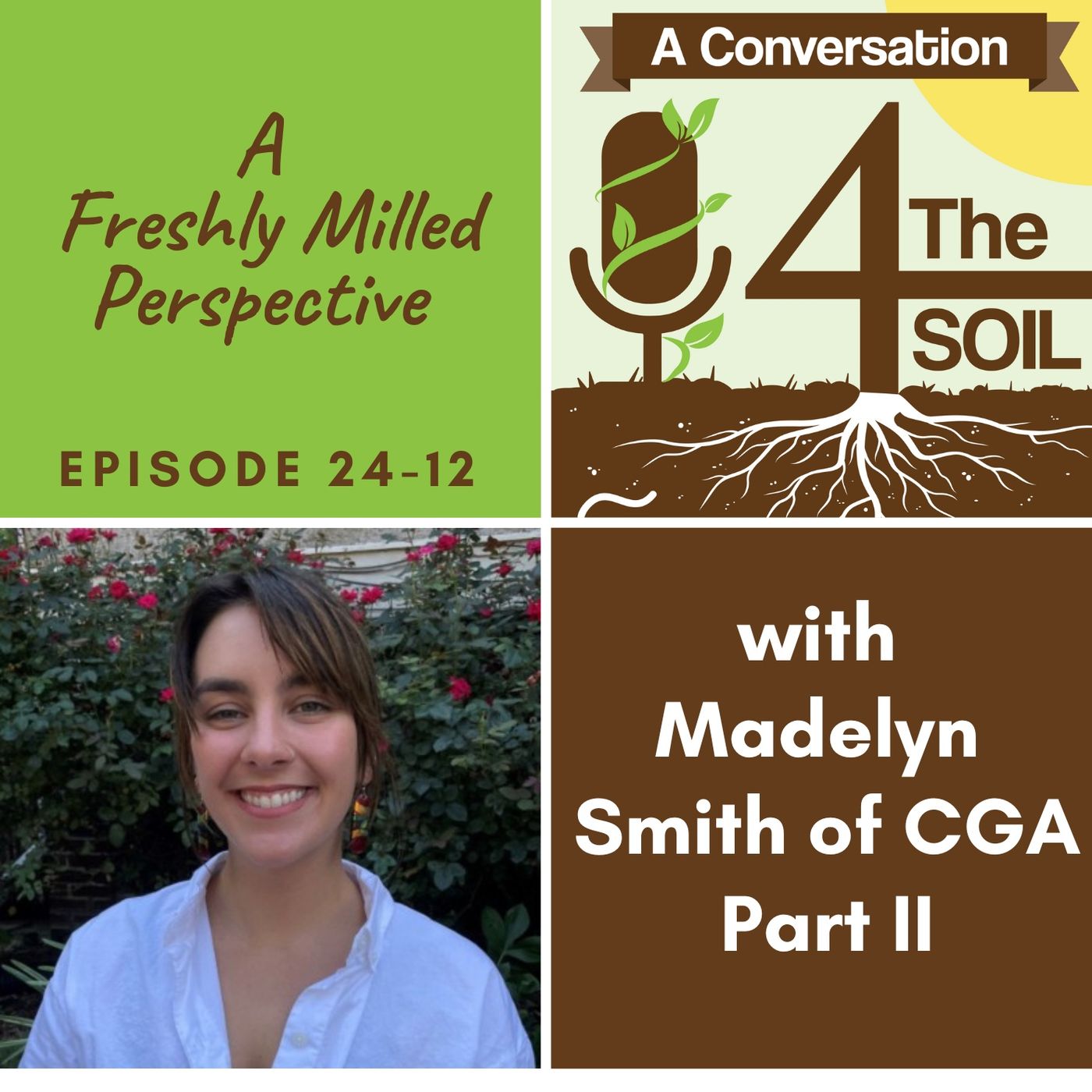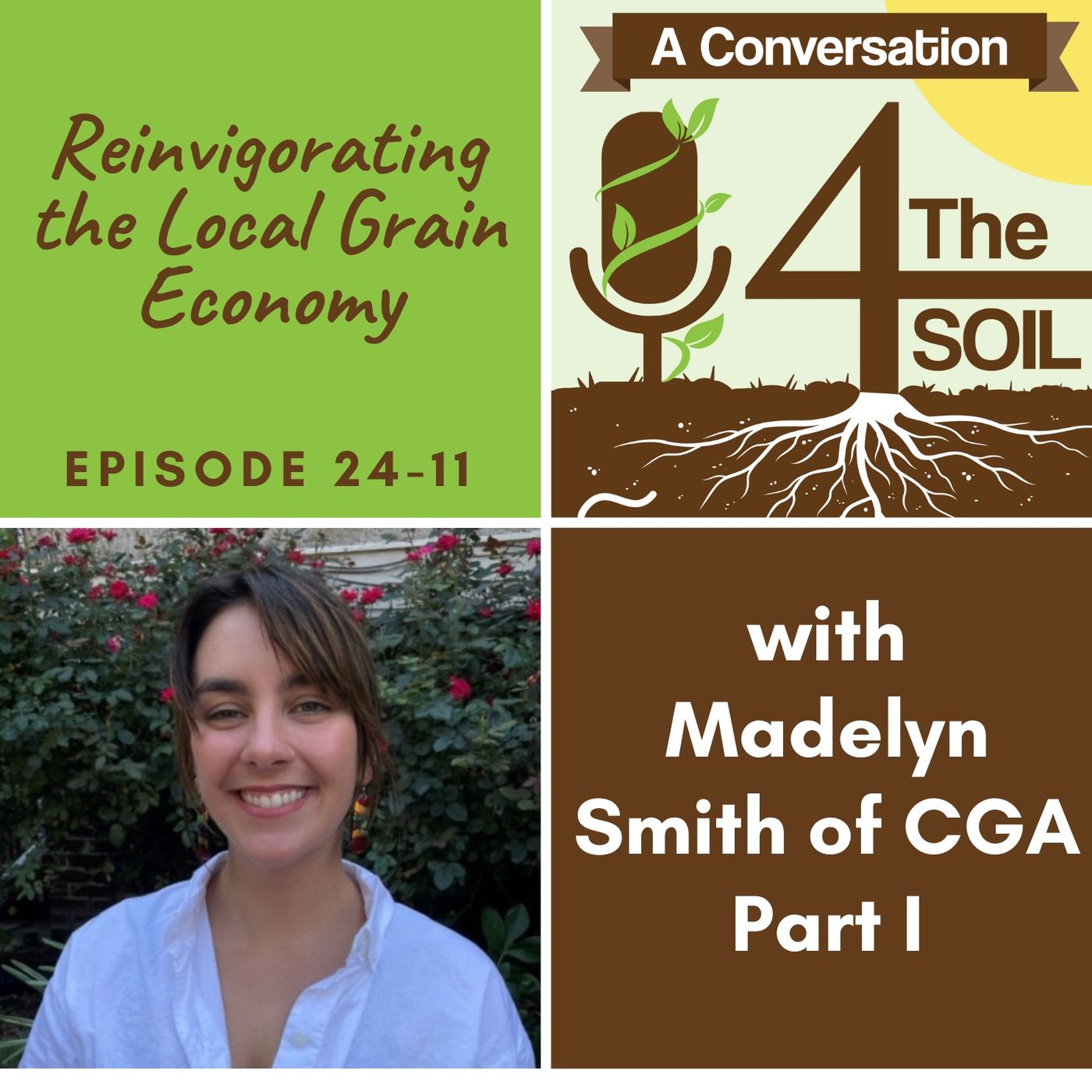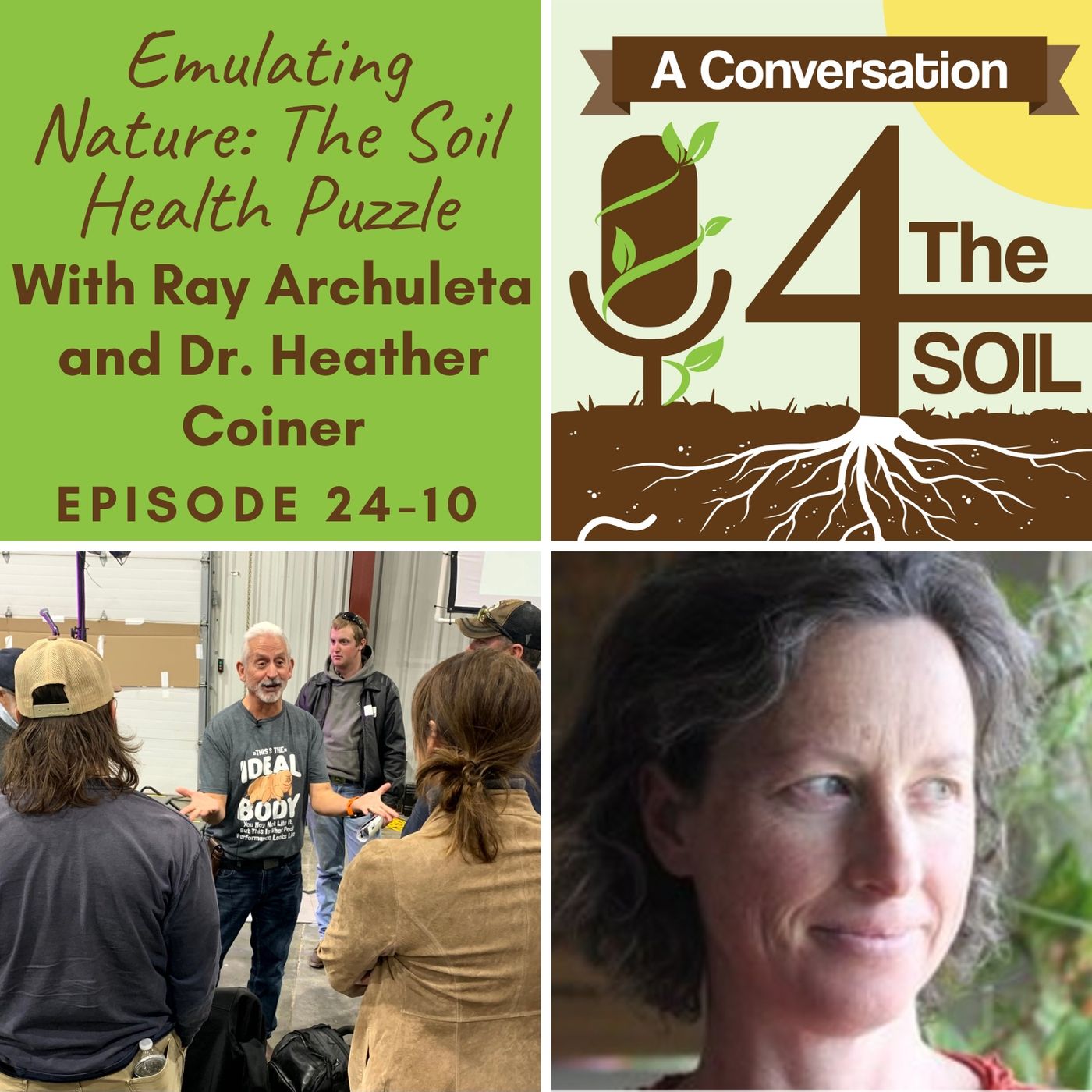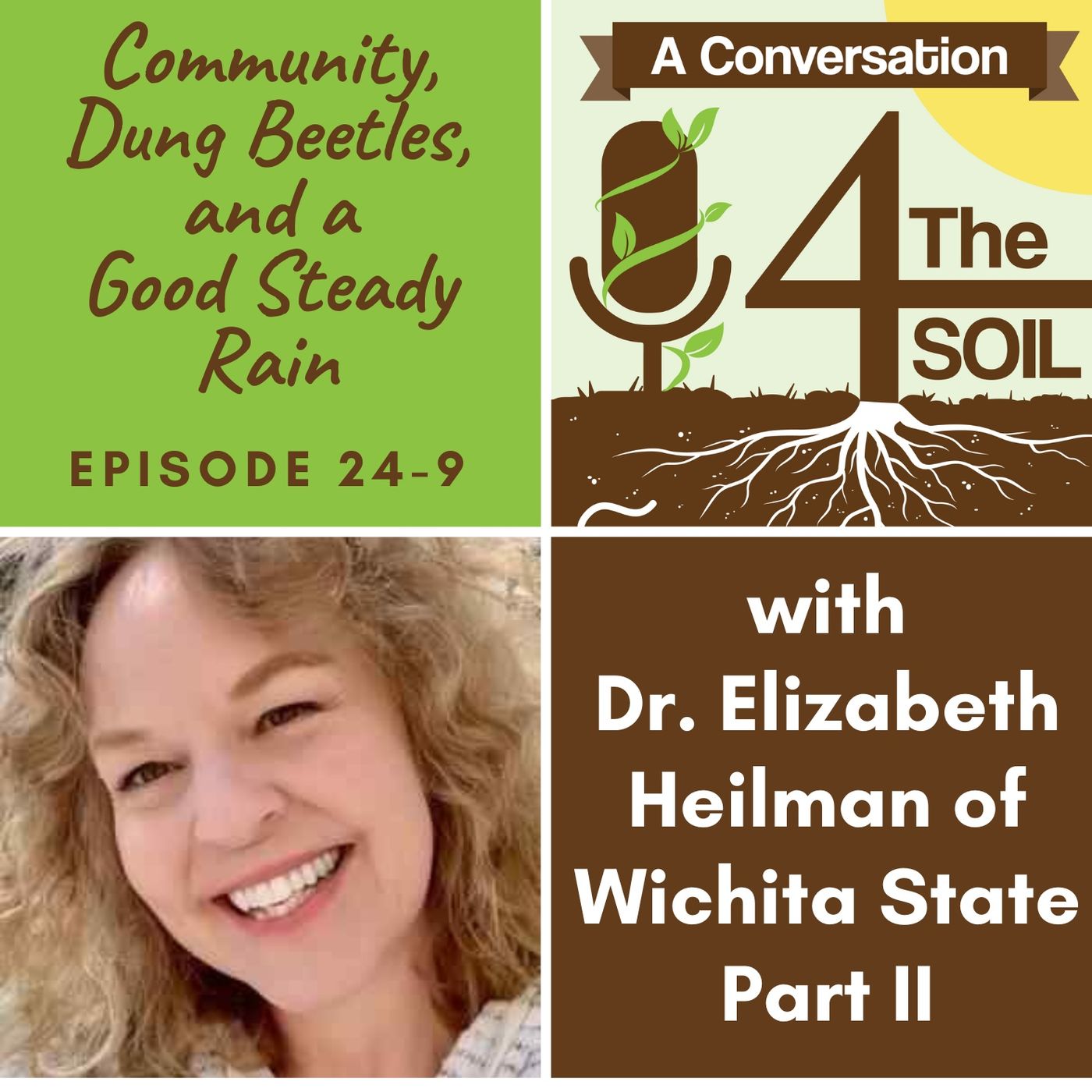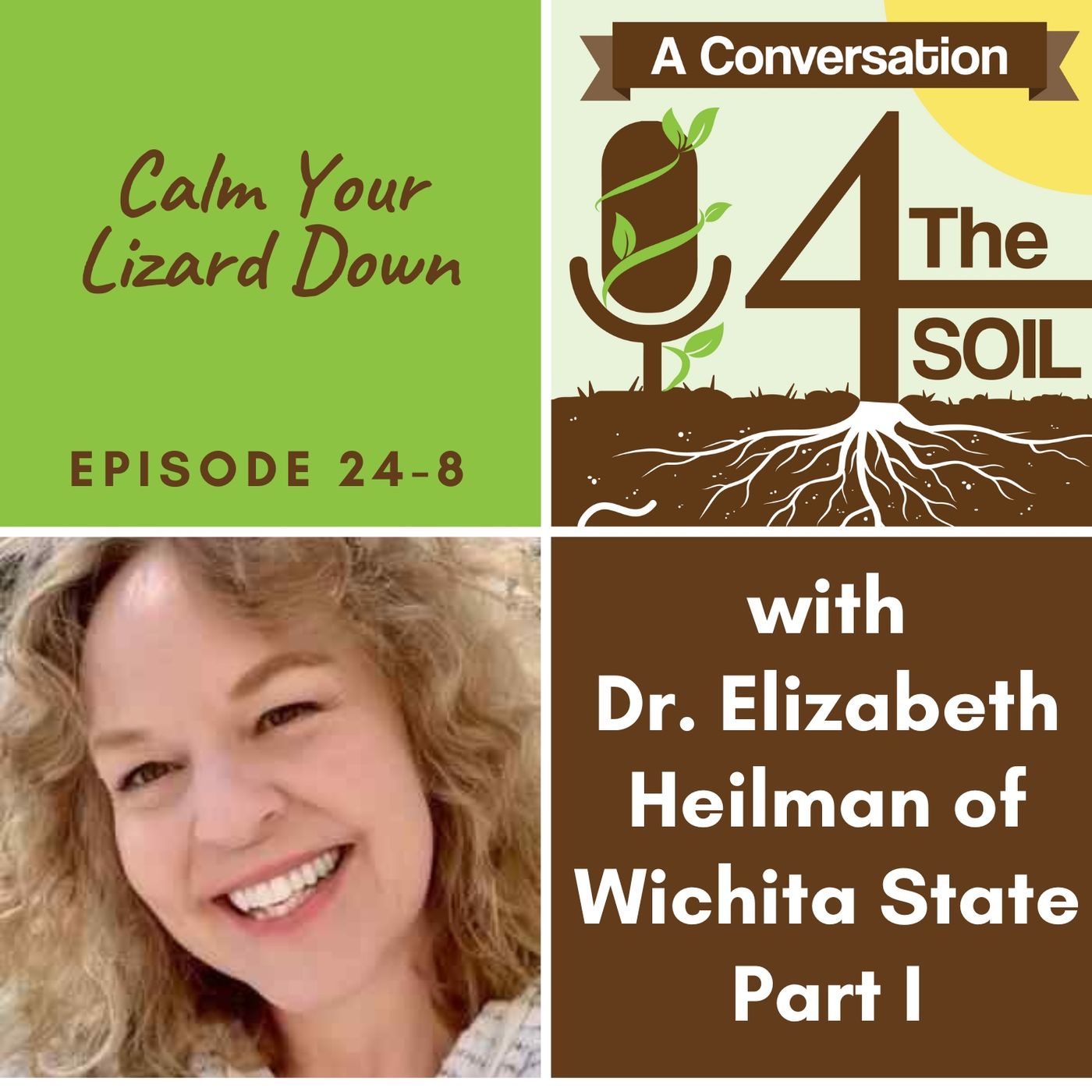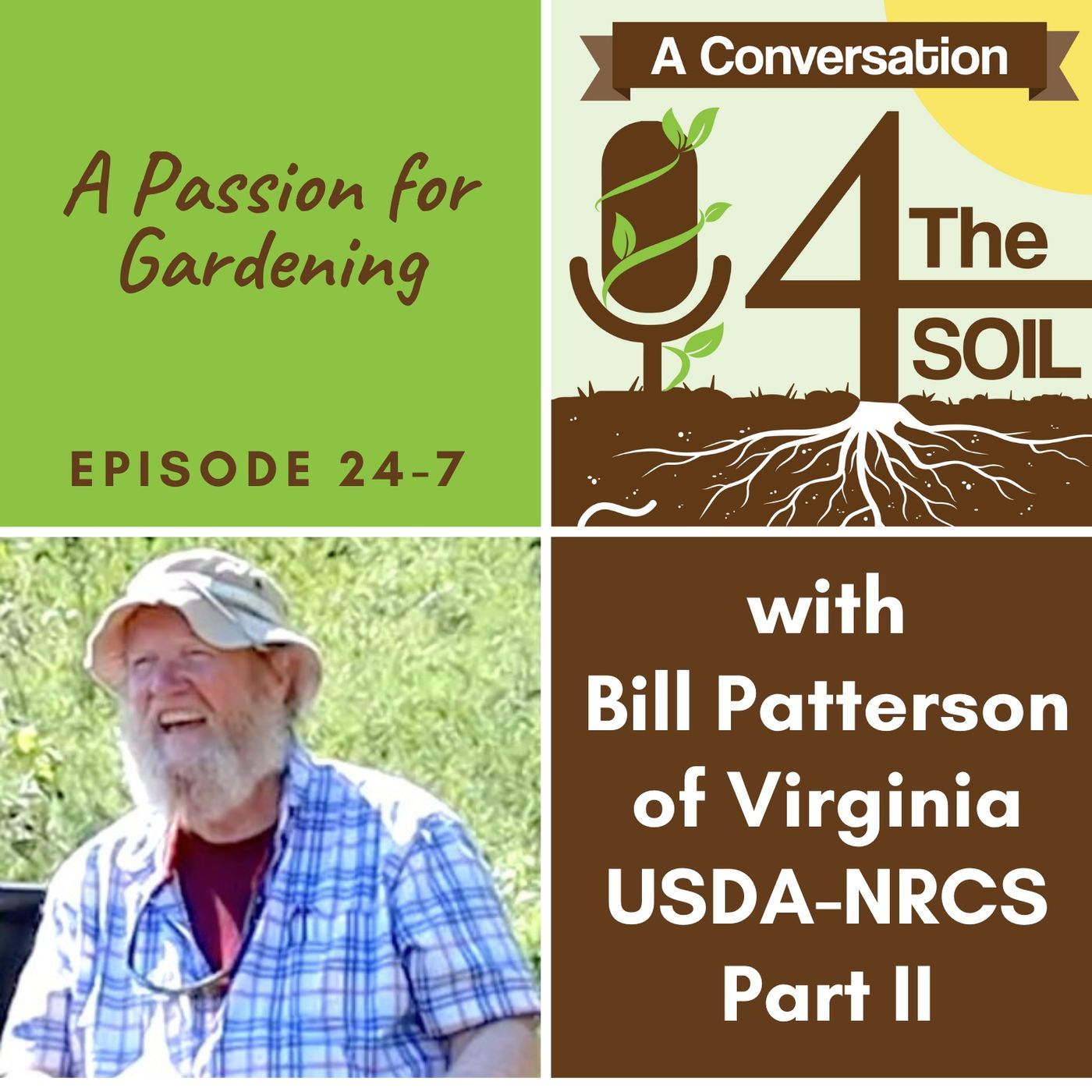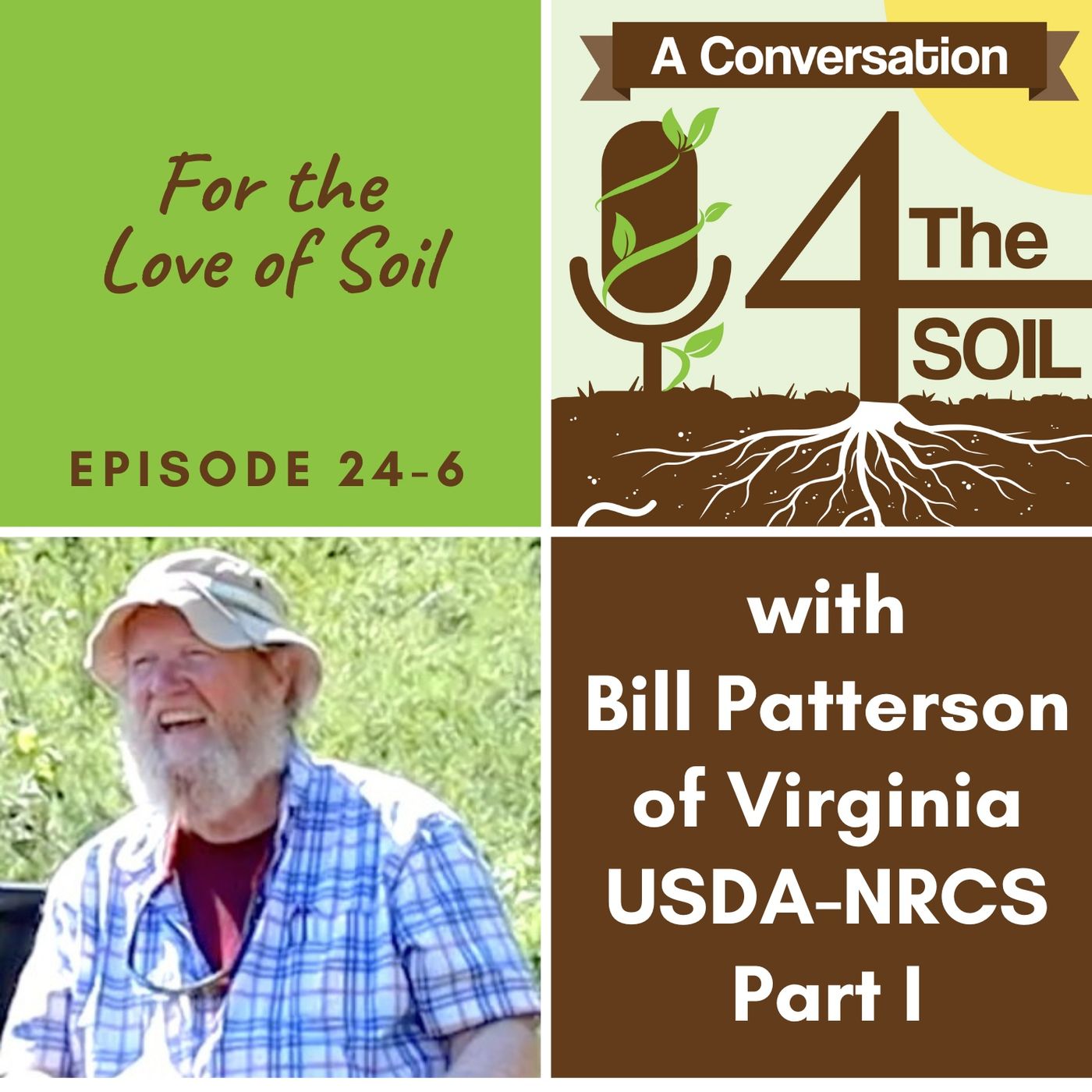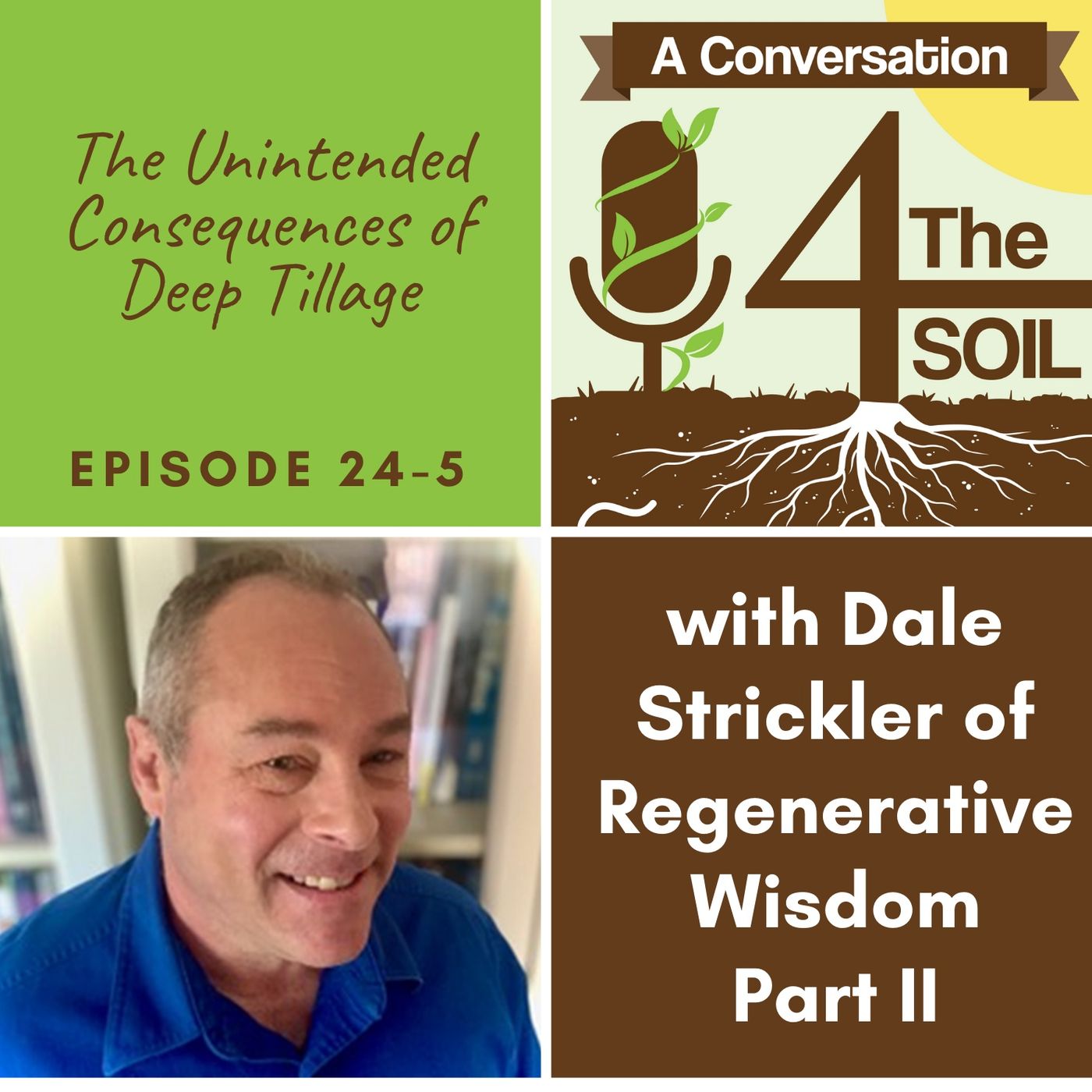Discover 4 The Soil: A Conversation
4 The Soil: A Conversation

4 The Soil: A Conversation
Author: Eric Scott Bendfeldt
Subscribed: 32Played: 339Subscribe
Share
© Copyright Eric Scott Bendfeldt
Description
Soil. What is it, really? It’s more than the dirt under our feet and the ground we stand on.
Soil is living and life-giving.
Listen as we unlock the mysteries of soil by speaking with people at the forefront of the soil health movement.
“4 The Soil: A Conversation” is part of the 4 The Soil Awareness Campaign led by Virginia Cooperative Extension and the Virginia Soil Health Coalition. The campaign’s purpose is to raise awareness of soil as an agricultural and natural resource critical to social, economic, and environmental health.
Hear and learn from farmers, agricultural professionals, conservation leaders, master gardeners, and many more on how and why to be 4 The Soil.
The podcast is a collaboration of Virginia Tech's School of Plant and Environmental Sciences and Center for Food Systems and Community Transformation, Virginia Cooperative Extension, On The Farm Radio, USDA-NRCS, and the Virginia Soil Health Coalition with specific funding from the Agua Fund, National Fish and Wildlife Foundation, and Virginia Tech’s Department of Agriculture, Leadership, and Community Education’s Community Viability grant program.
Stay tuned for the release of our first episode in October!
Soil is living and life-giving.
Listen as we unlock the mysteries of soil by speaking with people at the forefront of the soil health movement.
“4 The Soil: A Conversation” is part of the 4 The Soil Awareness Campaign led by Virginia Cooperative Extension and the Virginia Soil Health Coalition. The campaign’s purpose is to raise awareness of soil as an agricultural and natural resource critical to social, economic, and environmental health.
Hear and learn from farmers, agricultural professionals, conservation leaders, master gardeners, and many more on how and why to be 4 The Soil.
The podcast is a collaboration of Virginia Tech's School of Plant and Environmental Sciences and Center for Food Systems and Community Transformation, Virginia Cooperative Extension, On The Farm Radio, USDA-NRCS, and the Virginia Soil Health Coalition with specific funding from the Agua Fund, National Fish and Wildlife Foundation, and Virginia Tech’s Department of Agriculture, Leadership, and Community Education’s Community Viability grant program.
Stay tuned for the release of our first episode in October!
87 Episodes
Reverse
Are you interested in community collaboration and finding your agroecological voice and lens? Nicole Masters, founder of Integrity Soils and author of For the Love of Soil, discusses how an agroecological lens is used to view entire farm systems and value human dynamics with Jeff Ishee, Mary Sketch Bryant, and Eric Bendfeldt. Nicole has a love and fascination with soil but understands the risks involved with farming and starting new approaches to regenerating landscapes. Nicole highlights how "Biological Barbecues" were used in New Zealand to allow men and women to share their ideas and hear about emerging innovations in a comfortable environment while questioning existing dogma. Nicole emphasizes starting small and building soil health well because it just makes sense.Nicole will be a keynote speaker and trainer at the 2024 Virginia Farm-to-Table Conference in December and will present about agroecological leadership and resilience. Nicole will provide training and insight on the novel agroecological education methods and systems thinking she has practiced throughout Australasia, the United Kingdom, and North America in helping people align their dreams with their landscapes and contexts.Tune in wherever you get your podcasts.More information about Nicole Masters and Integrity Soils is available at https://integritysoils.com/ along with links to how to order and obtain Nicole's book For the Love of Soil. Nicole also recommended John Kempf's Regenerative Agriculture podcast as a continuing education resource. The Regenerative Agriculture podcast can be accessed at https://regenerativeagriculturepodcast.com/To learn about the 2024 Virginia Farm to Table Conference and to register to attend, please use the following link: https://tinyurl.com/2024VAF2TConfRegistration. Visit Virginia Cooperative Extension's website to learn about other educational programs, resources, and events. To learn about the Virginia Soil Health Coalition and join the Coalition's quarterly meetings, please visit https://www.virginiasoilhealth.org/. Recent 4 The Soil blog posts resources can be accessed at https://www.4thesoil.org/. For questions about soil and water conservation practices, call or visit a USDA Service Center, or a Virginia Soil and Water Conservation District office. As always, we encourage you to join the 4 The Soil movement and do your part to build soil health on your farm, in your garden, or community. Yes, we can all be 4 The Soil.
How do we create a love and fascination for the soil to better fit into the landscape? Nicole Masters, founder of Integrity Soils and author of For the Love of Soil, shares with Jeff Ishee, Mary Sketch Bryant, and Eric Bendfeldt how central people are to agroecology. Nicole grew up in New Zealand and developed an early love and fascination with soil. As an agroecologist, educator, systems thinker, and author, Nicole has extensive practical expertise and experiences in regenerative soil and landscape practices and coaching and training the trainers.Nicole will be a keynote speaker at the 2024 Virginia Farm-to-Table Conference in December and will present her love for soil and the foundations of agroecological leadership. Nicole will provide training and insight on the novel agroecological education methods and systems thinking she has practiced throughout Australasia, the United Kingdom, and North America in helping people align their dreams with their landscapes and contexts.Tune in wherever you get your podcasts.More information about Nicole Masters and Integrity Soils is available at https://integritysoils.com/ along with links to how to order and obtain Nicole's book For the Love of Soil.To learn about the 2024 Virginia Farm to Table Conference and to register to attend, please use the following link: https://tinyurl.com/2024VAF2TConfRegistration. Visit Virginia Cooperative Extension's website to learn about other educational programs, resources, and events. To learn about the Virginia Soil Health Coalition and join the Coalition's quarterly meetings, please visit https://www.virginiasoilhealth.org/. Recent 4 The Soil blog posts resources can be accessed at https://www.4thesoil.org/. For questions about soil and water conservation practices, call or visit a USDA Service Center, or a Virginia Soil and Water Conservation District office. As always, we encourage you to join the 4 The Soil movement and do your part to build soil health on your farm, in your garden, or community. Yes, we can all be 4 The Soil.
Are you interested in improving the water and nutrient-holding capacity of your soil? Have you heard about biochar as a soil amendment? Dr. Wayne Teel of James Madison University has studied and researched biochar for more than 15 years. Wayne discusses the promise and potential of biochar with Mary Sketch Bryant and Jeff Ishee as a follow-up to their conversation about agroforestry. Dr. Teel describes how biochar is formed through a combustion process with little or no oxygen present. Wayne distinguishes between types of biochar and those combusted at high and low temperatures as well as those types that may have nutrients already attached versus simple wood and plant-based materials.Biochar has been used throughout history to improve soil fertility and carbon sequestration. Its first recorded use was by people living in the Amazon River basin.Tune in wherever you get your podcasts.To learn about Dr. Teel's education and research interests, please visit JMU's faculty expert site at https://www.jmu.edu/university-communications/faculty-experts/experts/teel-wayne/index.shtml. If you are learning about biochar, Dr. Teel recommended two books by Albert Bates: The Biochar Solution: Carbon Farming and Climate Change and Burn: Using Fire to Cool the Earth.For questions about soil and water conservation practices, call or visit a USDA Service Center, or a Virginia Soil and Water Conservation District office. You may also be interested in Virginia Cooperative Extension's educational programs and Virginia's Agroforestry Regional Knowledge (ARK) Exchange. To learn about the Virginia Soil Health Coalition and join the Coalition's quarterly meetings, please visit https://www.virginiasoilhealth.org/. Recent 4 The Soil blog posts resources can be accessed at https://www.4thesoil.org/.As always, we encourage you to join the 4 The Soil movement and do your part to build soil health on your farm, in your garden, or community. Yes, we can all be 4 The Soil.
We all could benefit from reconnecting to soil, land, trees, and where our food comes from and how food is produced. Dr. Wayne Teel is a professor of geography at James Madison University in Harrisonburg, Virginia. He shares with Mary Sketch Bryant and Jeff Ishee how he works with his students at JMU to connect them to a farmer or field experience so the connection is real and tangible. Dr. Teel shares stories of his own experience working on a farm in the Columbia River basin in eastern Washington and his international experience working with farmers in Kenya and Mozambique. Wayne discusses and defines agroforestry for us and how managing interactions between plants, trees, and livestock can provide multiple benefits. He encourages farmers and landowners who are interested in agroforestry and practices like a riparian buffer of trees and plants to start small and observe what is naturally in the streamside area.To learn about Dr. Teel's education and research interests, please visit JMU's faculty expert site at https://www.jmu.edu/university-communications/faculty-experts/experts/teel-wayne/index.shtml. Dr. Teel's book "Regenerating the Ecology of Place" is available online and from independent bookstores. For questions about agroforestry and soil and water conservation practices like riparian buffers, call or visit a USDA Service Center, or a Virginia Soil and Water Conservation District office. You may also be interested in Virginia Cooperative Extension's educational programs and Virginia's Agroforestry Regional Knowledge (ARK) Exchange. To learn about the Virginia Soil Health Coalition and join the Coalition's quarterly meetings, please visit https://www.virginiasoilhealth.org/. Recent 4 The Soil blog posts resources can be accessed at https://www.4thesoil.org/.As always, we encourage you to join the 4 The Soil movement and to reconnect with soil, land, trees, and the farm community. Yes, we can all be 4 The Soil.
Do you like to volunteer, dig in the soil, and get your hands dirty? Planting and harvesting vegetables, experimenting with cover crops, and reducing tillage can be great fun as well. Virginia Cooperative Extension's Master Gardener program and the Fauquier Education Farm offer two tangible ways to volunteer, dig in the soil, get your hands dirty, and give back to the community. Tim Ohlwiler elaborates on how these volunteer-based programs serve as living laboratories where theory and hands-on practice merge for the benefit of participants and communities. Tim is an extension agent for horticulture with Virginia Cooperative Extension (VCE) in Fauquier County, Virginia. Tim was recognized as a friend of 4-H for his youth educational programming in 2023. Tim helps coordinate the local Master Gardener program and serves on the board of the Fauquier Education Farm. To learn about Virginia Cooperative Extension's Master Gardener, please call your local Virginia Cooperative Extension unit. Enjoy a virtual tour of the Fauquier Education Farm and learn about its programs and ways to support its mission at https://www.fauquiereducationfarm.org/. For questions about soil and water conservation and the protection of natural resources, call or visit a USDA Service Center, or a Virginia Soil and Water Conservation District office near you to learn about education programs, funding opportunities, and the technical assistance offered. To learn about the Virginia Soil Health Coalition and join the Coalition's quarterly meetings, please visit https://www.virginiasoilhealth.org/. Recent 4 The Soil blog posts resources can be accessed at https://www.4thesoil.org/.As always, we encourage you to join the 4 The Soil movement through gardening, farming, and volunteering in your community. Yes, we can all be 4 The Soil.
What are the realities for building soil health in orchards and vineyards? Tree fruit and grapes require different strategies for reducing competition from other woody perennials and weeds. Tension can exist between balancing crop needs and building soil health in orchards and vineyards. Tim Ohlwiler is an extension agent for horticulture with Virginia Cooperative Extension (VCE) in Fauquier County, Virginia. Tim works with nurseries, landscapers, orchards, vineyards, small fruit growers, and vegetable growers in the Northern Piedmont Region. In this episode, Tim talks with Jeff, Mary, and Eric about horticultural realities and soil health and how he is working with orchards and vineyards to minimize soil disturbance, while also working to get school children excited and energized about soil science. For specific follow-up questions for Tim Ohlwiler, his contact information is available at https://fauquier.ext.vt.edu/staff.html If you have questions about building soil health within orchards and vineyards or the benefits of following climate-smart principles in your cropping and farming systems, please visit your local Virginia Cooperative Extension unit, a USDA Service Center, or a Virginia Soil and Water Conservation District office near you. To learn about the Virginia Soil Health Coalition and join the Coalition's quarterly meetings, please visit https://www.virginiasoilhealth.org/.To review the four core soil health principles and access the recent 4 The Soil blog posts that Jeff Ishee referenced, please visit https://www.4thesoil.org/.As always, we would love to learn about your soil health journey and encourage you to join the 4 The Soil movement. Yes, we can all be 4 The Soil.
Farming and market gardening require continually learning and appropriately managing risks. Robert "Bob" Waring of Brandon Farms in Essex County, Virginia is a proponent of cover crops, soil health, and on-farm research. Bob states he sees the beginning of a movement, particularly as farmers learn from other farmers. He has embraced cover crops, and he consistently maps biomass yields and samples his fields' soil nutrient levels.In testing theories and making observations through the years, Bob has been able to reduce external inputs of nitrogen, phosphorus, potassium, and lime, while increasing yields and return on investments. Bob attributes some of these results to improved biological activity in the soil and restored natural nutrient cycling. In addition, the summer cover crops he plants protect soil moisture, reduce soil temperatures compared to bare ground, and buffer soil pH. If you have questions about building soil health and the benefits of following climate-smart principles in your cropping and farming systems, please visit your local Virginia Cooperative Extension unit, a USDA Service Center, or a Virginia Soil and Water Conservation District office near you. To learn about the Virginia Soil Health Coalition and join the Coalition's quarterly meetings, please visit https://www.virginiasoilhealth.org/.To review the four core soil health principles and access the recent 4 The Soil blog posts that Jeff Ishee referenced, please visit https://www.4thesoil.org/.As always, we would love to learn about your soil health journey and encourage you to join the 4 The Soil movement.
The economics of farming are always tenuous and subject to many market and climatic forces. Robert "Bob" Waring of Brandon Farms of Dunnsville, Virginia describes himself as a return-on-investment (ROI) kind of guy. With the tenuous, volatile nature of farming, Bob is constantly evaluating Brandon Farms' cropping system as a whole and looking for sound input reduction strategies. Over the past fifteen years, Bob has focused on growing his fertilizer (nitrogen, phosphorus, and potassium) and farm profitability through timely cover crop mixtures and management. Hairy vetch and black oats have worked well in his corn and soybean rotations and helped Brandon Farms dramatically reduce fertilizer and pesticide costs. If you are new to cover cropping, Bob recommends finding a legume like clover, cowpeas, or Austrian winter pea that fits in your system as a starting point.American Farmland Trust's Soil Health Case Study of Brandon Farms is accessible at https://farmlandinfo.org/wp-content/uploads/sites/2/2024/05/brandon-farms-soil-health-case-study.pdf If you have questions about the economic and climate resilience of your cropping and farming systems, please visit your local Virginia Cooperative Extension unit, a USDA Service Center, or a Virginia Soil and Water Conservation District office near you. To learn about the Virginia Soil Health Coalition and join the Coalition's quarterly meetings, please visit https://www.virginiasoilhealth.org/. To access the recent 4 The Soil blog posts that Jeff Ishee referenced, please visit https://www.4thesoil.org/. As always, we would love to hear your experience and perspective on ways you have invested in soil health and what financial and ecological returns you have experienced.
To know where our food comes from, we are encouraged to know the farmer who grew our food. Nicolas "Nico" Melas of Mill Song Bakery approaches his craft as a farmer-miller-baker in the tradition of the artisans he apprenticed to in France. Nico emphasizes that you should know your local baker to fully understand and appreciate the quality of wheat and other grains. Nico reflects on how the growing, sourcing, processing, milling, fermenting, and mixing of grain and flour all play a role in the artisanal baking process. For Nico, flavor and health go together; and bread needs to smell and taste like freshly milled grain. Mill Song Bakery's inspiring story, values, and bread-baking techniques can be accessed at https://www.millsongbakery.com/about-us. The video Jeff referenced Against the Grain, Beyond the Grind outlines farm-to-table connections from local soils and farms to a local stone-ground mill and local bakery.Bread: A Baker's Book of Techniques and Recipes by Jeffrey Hamelman is available online or can be ordered from a local bookstore. To learn about the Virginia Soil Health Coalition and join the Coalition's quarterly meetings, please visit https://www.virginiasoilhealth.org/. To access the 4 The Soil blog and the more than seventy episodes of the 4 The Soil: A Conversation podcast, please visit https://www.4thesoil.org/. We would love to hear your experience and perspective on how flavor and health go together, particularly as we learn more about meaningful connections related to nutrition and human health from the soil up.
Nicolas "Nico" Melas of Mill Song Bakery is a thought leader within Virginia's regional food systems and a catalyst with the expanding Common Grain Alliance. Nico and his family, along with a growing network of farmers, millers, bakers, and food businesses in Virginia and the greater Mid-Atlantic Region, are working through artful farming, milling, and baking to seed and feed a strong, resilient, diverse localized food grain economy. Jeff Ishee and Eric Bendfeldt talk with Nico about his journey in farming and baking and how healthy grains and bread benefit soil health, water quality, food security, and community nutrition. To learn more about Mill Song Bakery's inspiring story, values, and bread baking, please visit https://www.millsongbakery.com/about-us. The video Against the Grain, Beyond the Grind outlines farm-to-table connections from local soils and farms to a local stone-ground mill and local bakery and how food eventually makes its way to local tables.To access the 4 The Soil blog and the more than seventy episodes of the 4 The Soil: A Conversation podcast, please visit https://www.4thesoil.org/. To learn about the Virginia Soil Health Coalition, visit https://www.virginiasoilhealth.org/. We would love to hear how your artful and healthful foodways support soil health, water quality, local farmers, and community-building.
Ennis and Phil Carter of Flip Charts and Social Impact Studios bring together their expertise in social sciences and education to amplify a simple message that soil health and music are for everyone. We can all "literally" dig soil health and music in a multitude of ways. In part II, Ennis and Phil explain how memories and stories help us find common ground, connect dots, and stir our imaginations. Ennis spoke of the recent 4 The Soil coloring book developed by Social Impact Studios and the playful characters of an owl and a worm (Hoot and Annie) that stirred their imaginations for a 4 The Soil song and a musical hootenanny. You are encouraged to bring your musical instruments (banjos, guitars, mandolins, harmonicas, etc.) and lawn chairs to the Hoot-n-Annie event that will be held this Sunday, June 23, 2024, in celebration of National Soil Health Day, Sunday. The Hoot-n-Annie will be held from 12:30 to 6:30 p.m. at Camp pHyre in Rice, Virginia. Ennis and Phil provided a teaser of the schoolhouse-style 4 The Soil song to inspire and remind us soil health and music are for everyone. To learn more about Flip Charts, the 4 the Soil cartoon characters, and the Hoot-n-Annie event, please refer to our recent 4 The Soil blog post at https://www.4thesoil.org/post/join-the-flipcharts-and-camp-phyre-s-hoot-n-annie-eventTo access the 4 The Soil blog and the more than seventy episodes of the 4 The Soil: A Conversation podcast, please visit https://www.4thesoil.org/. To learn about the Virginia Soil Health Coalition, visit https://www.virginiasoilhealth.org/. Again, we would love to hear and see pictures of how you celebrated National Soil Health Day.
In anticipation of National Soil Health Day, Ennis and Phil Carter of Flip Charts and Social Impact Studios composed a fun 4 The Soil song to celebrate and emphasize how we can all take action for the soil and planet. Ennis and Phil bring together more than forty years of life and creative work. Their collaboration and creativity integrate music, culture, anthropology, graphic design, and community organizing. Ennis and Phil highlight how music and art translate our emotions and hearts into action.The upcoming Hoot-n-Annie event will be held on National Soil Health Day, Sunday, June 23, 2024, at Camp pHyre in Rice, Virginia. During our conversation, Ennis and Phil shared a snippet of the schoolhouse-style 4 The Soil song to engage and inspire all of us. To learn more about Flip Charts and the Hoot-n-Annie event, please refer to our recent 4 The Soil blog post at https://www.4thesoil.org/post/join-the-flipcharts-and-camp-phyre-s-hoot-n-annie-eventTo access the 4 The Soil blog and the more than seventy episodes of the 4 The Soil: A Conversation podcast, please visit https://www.4thesoil.org/. To learn about the Virginia Soil Health Coalition, visit https://www.virginiasoilhealth.org/. We would love to hear how you celebrated National Soil Health Day and the ways you are taking action to support soil health and the planet.
The aroma of freshly milled and ground grain is distinct and inviting whether in preparing bread, pizza, or a vat of beer. Madelyn Smith of the Common Grain Alliance offers a freshly milled perspective on a range of topics needed to strengthen the regional food system and build the supply of regional grains to meet consumer demand. Madelyn says that bakers and chefs are often the best storytellers of why local grains are so important to their businesses, however, it is often the taste, flavor, and aroma of the food and beverages that create a lasting love and commitment to local and regional grains.The Common Grain Alliance is a growing network of over 120 farmers, millers, bakers, and food businesses throughout Virginia and the Mid-Atlantic Region. For more information about the Common Grain Alliance and the many new video resources on growing and marketing small grains, legumes, and dryland rice, please visit https://www.commongrainalliance.org/To access the 4 The Soil blog and the more than seventy episodes of the 4 The Soil: A Conversation podcast, please visit https://www.4thesoil.org/. To learn about the Virginia Soil Health Coalition, visit https://www.virginiasoilhealth.org/. We would love to hear how you are supporting soil health, local farmers, bakers, chefs, and a stronger regional food system and grain economy.
How can we reinvigorate the local and regional grain economy? What is possible if grain farmers, millers, maltsters, bakers, brewers, pasta makers, educators, and researchers dream and work together? Why are local, high-quality, sustainably raised small grains like rye, oats, and others not more easily available in the Virginia and the Mid-Atlantic Region marketplace? Mary Sketch Bryant, Jeff Ishee, and Eric Bendfeldt speak with Executive Director Madelyn Smith of the Common Grain Alliance (CGA) about these questions and the growing effort to reinvigorate the local grain economy. Madelyn shares her journey of working on conservation and facilitating policy development for soil health and conservation practices. She also shares how CGA started in Virginia and continues growing as a network of over 120 farmers, millers, bakers, and food businesses from southern Pennsylvania to northern North Carolina. For more information about the Common Grain Alliance, its membership, upcoming gatherings, and shopping for Mid-Atlantic small grains, please visit https://www.commongrainalliance.org/To access the 4 The Soil blog and the more than seventy episodes of the 4 The Soil: A Conversation podcast, please visit https://www.4thesoil.org/. To learn about the Virginia Soil Health Coalition, visit https://www.virginiasoilhealth.org/. We would love to hear how you are diversifying your cropping and farming systems for soil health and a stronger local economy.
Can we emulate nature with our soil health-building systems? Where do local small grains fit in the soil health puzzle? Ray Archuleta of the Soil Health Academy and retired soil health educator with USDA-Natural Resources Conservation Service discusses why working in concert with nature is important to farming. Ray is a big proponent of no-till farming and putting life back into systems. Tillage disrupts and kills soil fungi and sets the system back. Ray sees food and the health of the soil as medicine and critically intertwined with nature. Dr. Heather Coiner of the Common Grain Alliance adds to this discussion and shares how small grain crop rotations are another essential piece to the soil health puzzle and biological pathways. In addition, a stronger local grain economy can provide multiple benefits to farmers, communities, and the overall health of people. For more information about the Soil Health Academy and Common Grain Alliance, please visit their websites at https://soilhealthacademy.org/ and https://www.commongrainalliance.org/To access the 4 The Soil blog and the more than seventy episodes of the 4 The Soil: A Conversation podcast, please visit https://www.4thesoil.org/. To learn about the Virginia Soil Health Coalition, visit https://www.virginiasoilhealth.org/. We would love to hear how you are working with nature and what you are doing to know your farmer in support of local and regional agriculture.
Have you ever been on a walk and observed a dung beetle or two rolling a bit of dung down the path? Have you wondered what conditions make a good steady rain? While many things are out of our control, we can control some things if we are willing to learn and work together as a community.Dr. Elizabeth Heilman, Professor of Education at Wichita State University, elaborates on the power of observation in ecology and farming with Mary Sketch Bryant, Jeff Ishee, and Eric Bendfeldt, specifically as the power of observation relates to weather patterns, peer-to-peer learning, and creating more stable farming systems. Dr. Heilman shares how a "community of practice" can be a safe place to share experiences and build relationships that can help farmers "balance out the weather cycle" and "reduce drought and flooding." For a description of Dr. Heilman's teaching, research, and recent publications, please visit https://www.wichita.edu/profiles/academics/applied_studies/School_of_Education/Heilman-Elizabeth.php For the free soil health resource guides that Dr. Heilman referenced, please visit Green Cover Seeds at https://greencover.com/freeguides/ The tenth edition is currently accessible. Copies of the fifth edition are available in English, French, and Spanish.To access the seventy episodes of the 4 The Soil: A Conversation podcast and additional resources on soil health-building principles, please visit https://www.4thesoil.org/. To learn about the Virginia Soil Health Coalition, visit https://www.virginiasoilhealth.org/. We would love to hear how you work to balance the water cycle on your farm, ranch, or garden.
Are you resistant to change or risk averse? You may need to calm your lizard down and understand how important safety and security are to change, risk aversion, and the adoption of new behaviors. Dr. Elizabeth Heilman, Professor of Education at Wichita State University, talks with Mary Sketch Bryant, Jeff Ishee, and Eric Bendfeldt about how our "lizard brains" relate to farming and ranching. For farmers and ranchers, many day-to-day factors (i.e., markets, weather, public policy, etc.) are out of their control. The lack of control can cause stress and anxiety that activate our lizard brains. In thinking about emotional and environmental ecology, Dr. Heilman shares several strategies for self-care and calming down the anxious parts of our brain and nervous system. The strategies include keeping a done list; a gratitude list; your mission statement visible; and remembering to Eat That Frog. For a description of Dr. Heilman's teaching, research, and recent publications, please visit https://www.wichita.edu/profiles/academics/applied_studies/School_of_Education/Heilman-Elizabeth.phpTo access close to seventy episodes of the 4 The Soil: A Conversation podcast and additional resources on soil health-building principles, please visit https://www.4thesoil.org/. To learn about the Virginia Soil Health Coalition, visit https://www.virginiasoilhealth.org/. We would love to hear your stories about self-care and strategies for regenerating the ecosystem health of your farm and organization.
A passion for gardening and tasty, flavorful tomatoes, cucumbers, and hot peppers continues to drive Bill Patterson's experimentation with crop rotations, mulching, composting, and winter and summer cover crops in his home garden. Mary Sketch Bryant and Eric Bendfeldt talked previously with Bill about his conservation work with soil health and grazing lands. Bill is equally passionate about his home garden as he is about farmers' grazing lands.He uses his garden as an experimentation station to test and observe the soil health-building principles. Bill emphasizes: "rotations, rotations, rotations," and allowing the critters to do the tillage for you. With his love for building soil carbon and enjoying a great-tasting tomato, Bill's gardening rotation includes a diverse mixture of summer and winter cover crops.To learn about winter and summer cover crops, please visit the Southern Cover Crops Council's website at https://southerncovercrops.org/ The site includes a selection tool for vegetables, grazing, and row crops. For information about careers and programs of the Virginia USDA-Natural Resources Conservation Service, please visit https://www.nrcs.usda.gov/conservation-basics/conservation-by-state/virginia To access close to seventy episodes of the 4 The Soil: A Conversation podcast and additional resources on soil health-building principles, please visit https://www.4thesoil.org/. To learn about the Virginia Soil Health Coalition, visit https://www.virginiasoilhealth.org/. We would love to hear your stories about the passion you have for experimenting with the four core soil health principles in your garden, cropland, and grazing lands.
A love and curiosity for soil sparked a fifty-year career in soil and natural resources conservation. Mary Sketch Bryant and Eric Bendfeldt talk with Bill Patterson, retired district conservationist and present grazing specialist with Virginia USDA-Natural Resources Conservation Service, about his career and to hear his insights on soil health and grazing. Bill is affectionately called "Pops" and has served as a mentor for many farmers and soil conservationists. Bill was recently recognized at the Virginia Farm to Table Conference for his lifetime achievement with the 2023 Carl Luebben Soil Health and Water Quality Award.In reflecting on his career that started in 1974, Bill states that we know more about soil health, but there is still a whole lot more to learn. The more we learn, the less we know. Therefore, it is important to ask good questions, be observant, remain flexible, stay curious, and love what you do.To learn about careers and programs of the Virginia USDA-Natural Resources Conservation Service, please visit https://www.nrcs.usda.gov/conservation-basics/conservation-by-state/virginia To access more than sixty episodes of the 4 The Soil: A Conversation podcast and additional resources on soil health-building principles, please visit https://www.4thesoil.org/. To learn about the Virginia Soil Health Coalition, visit https://www.virginiasoilhealth.org/. We would love to hear your stories and the ways you follow the four core soil health principles and express your love for the soil.
Are we there yet? Have we arrived at the intended destination? Have we reached the goal we set out for improving soil health and how soil functions? Have our good intentions of attempting to loosen the soil resulted in negative unintended consequences? In part one of our conversation with Dale Stricker of Regenerative Wisdoms, Dale stated that tillage and soil disturbance make farmers very susceptible to drought. However, in relying on deep tillage and subsoiling to remove a mechanical barrier (i.e., a compacted layer or hardpan), farmers may exacerbate the problem, and tillage can result in unintended and unforeseen consequences in decreased root growth, increased compaction, and limited soil porosity. Dale shares how roadbuilding is very analogous to the procedures that farmers follow in subsoiling and the multiple tillage passes often used to try to loosen the soil. Dale encourages farmers and market gardeners to consider soil health as a bank account, where deposits outweigh withdrawals that encourage real wealth and health. For more information about Dale's books on drought resilience, pasture management, restoring soil health, and the overall mission of Regenerative Wisdom, please visit https://www.regenerativewisdom.com/To access two years of the 4 The Soil: A Conversation podcast archives and additional resources on soil health-building principles, please visit https://www.4thesoil.org/. To learn about the Virginia Soil Health Coalition, visit https://www.virginiasoilhealth.org/. We would love to hear your stories and the ways you are following the four core soil health principles.
Comments
Top Podcasts
The Best New Comedy Podcast Right Now – June 2024The Best News Podcast Right Now – June 2024The Best New Business Podcast Right Now – June 2024The Best New Sports Podcast Right Now – June 2024The Best New True Crime Podcast Right Now – June 2024The Best New Joe Rogan Experience Podcast Right Now – June 20The Best New Dan Bongino Show Podcast Right Now – June 20The Best New Mark Levin Podcast – June 2024
 United States
United States

